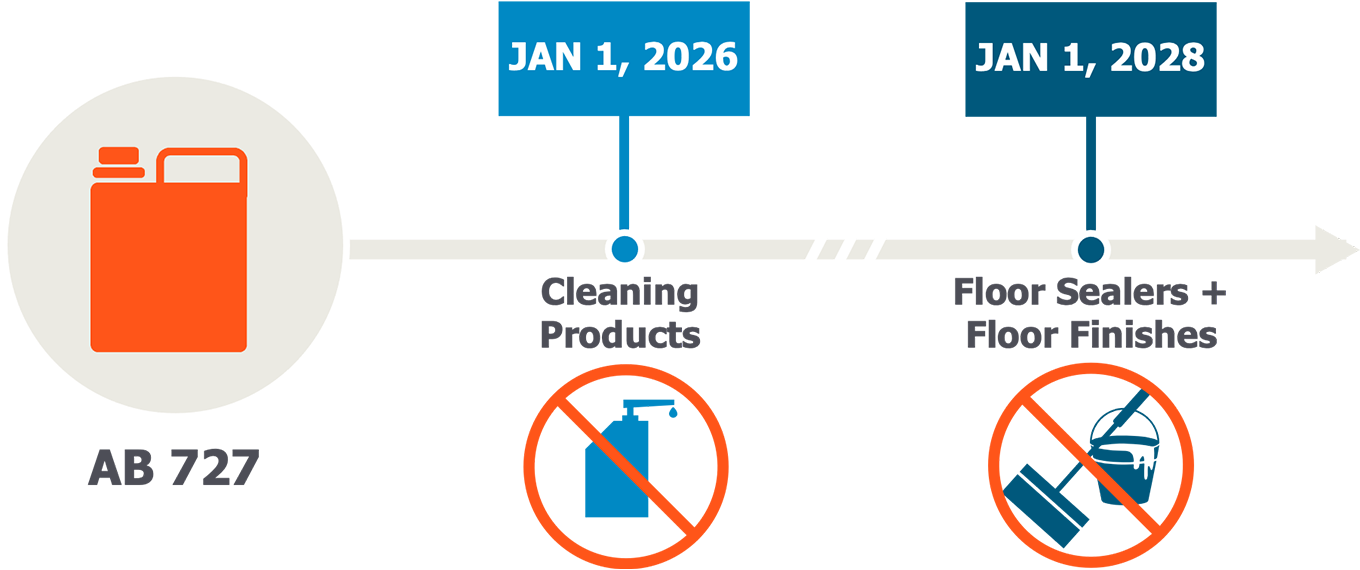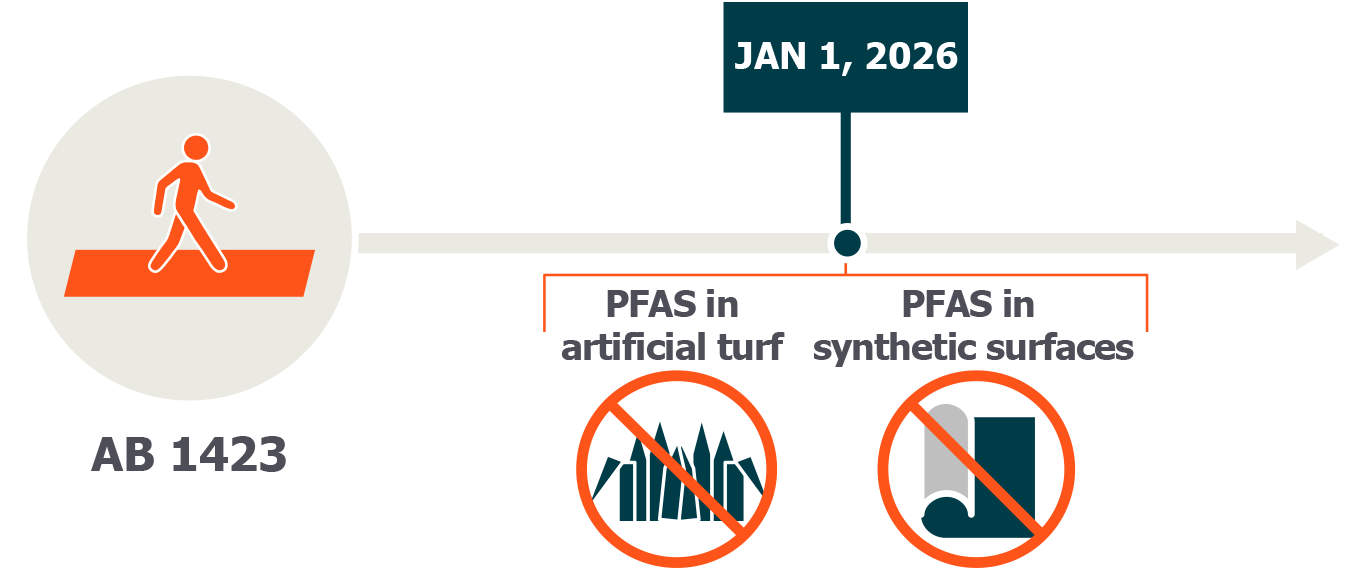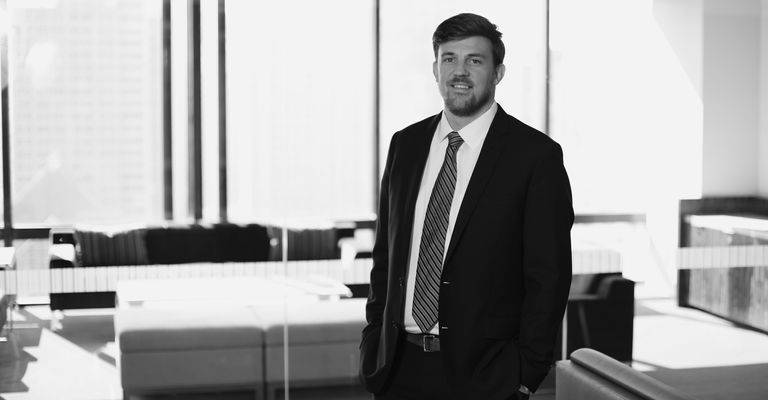BCLPemerging.com
California legislature approves bans on PFAS in cleaning products and artificial turf
Sep 18, 2023Summary
Last week the California legislature passed two bills regulating PFAS in certain products:
- AB 727 which restricts the use of PFAS in cleaning products and floor sealers and finishes; and
- AB 1423 which restricts the use of PFAS in artificial turf.
As discussed below, beginning on January 1, 2026 these products can no longer contain intentionally added PFAS, or total organic fluorine above certain thresholds, except for floor sealers and floor finishes where the effective date is January 1, 2028.
Governor Newsom is expected to sign both bills into law.
AB 727 – Cleaning Products Containing PFAS

- January 1, 2026 for cleaning products
- January 1, 2028 for floor sealers and floor finishes
CLEANING PRODUCTS
No person or entity shall manufacture, sell, deliver, distribute, hold, or offer for sale in commerce in California a “cleaning product” containing any of the following:
- Intentionally added PFAS; or
- PFAS in a product or ingredient at or above the following thresholds, as measured in total organic fluorine:
- Commencing January 1, 2026, 50 parts per million (“ppm”).
- Commencing January 1, 2027, 25 ppm.
- Commencing January 1, 2028, 10 ppm.
FLOOR SEALERS AND FLOOR FINISHES
No person or entity shall manufacture, sell, deliver, distribute, hold, or offer for sale in commerce a “floor sealer” or a “floor finish” containing any of the following:
- Intentionally added PFAS; or
- PFAS at or above 10 ppm, as measured in total organic fluorine.
“Cleaning product” means a finishing product that is a:
- Air care product (a product used to “enhance or condition the indoor environment by eliminating unpleasant odors or freshening the air”);
- Automotive product (a product used to “clean, disinfect, maintain the appearance of, polish, protect, buff, condition, or otherwise care for a motor vehicle”);
- General cleaning product;
- Polish or floor maintenance product (a product used to “clean, disinfect, polish, protect, buff, condition, temporarily seal, strip, or maintain furniture, floors, metal, leather, or other surfaces”) used primarily for janitorial, domestic, or institutional cleaning purposes; or
- Water vessel product (a product used to “maintain the appearance of, or otherwise care for, a water vessel”).
“General cleaning product” means a soap, detergent, or other chemically formulated consumer product labeled to indicate that the purpose of the product is to clean, disinfect, sanitize, or otherwise care for any of the following:
- Fabric, dishes, or other wares;
- Surfaces, including, but not limited to, floors, furniture, countertops, showers, or baths;
- Other hard surfaces, such as stovetops, microwaves, and other appliances.
Exception: “Polish or floor maintenance products” do not include treatments containing PFAS for use on converted textiles or leathers.
“Floor sealer” or “floor finish” means a chemically formulated industrial or institutional floor product that cures into a film upon application and is advertised for or labeled solely as a sealer, finish, or combination of sealer and finish.
A “floor sealer” is a product that provides the first layer of protection by filling gaps in uneven and porous surfaces and by creating a durable, polymeric coating with high chemical resistance and provides the base coat for floor finishes and helps floor finishes adhere to flooring.
A “floor finish” is a product that provides a protective surface layer that is the first line of defense against floor damage.
Maximum of $10,000 per day for each violation.
There are several important aspects to this law, the first of which is its broad scope, applying to all domestic, janitorial, and institutional cleaning products sold in the state. The second is the fact that the concentration limits are much lower than the limits in any other consumer product PFAS laws passed to date in California, and elsewhere in the country.
To date, California’s 50 ppm limit for total organic fluorine in textile products (which goes into effect on January 1, 2027) was the lowest limit, but the new law introduces a 10 ppm total organic fluorine limit for these products.
Compliance is expected to be a challenge as the many different branches of impacted industries evaluate their supply chains to identify and remove potential PFAS sources.
AB 1423 – PFAS in artificial turf or synthetic surfaces

- January 1, 2026
“Covered surface” means “artificial turf or a synthetic surface that resembles grass.”
PUBLIC ENTITIES
Public entities may no longer purchase a Covered Surface if it contains Regulated PFAS.
- This purchase ban also applies to public or private schools serving pupils in kindergarten or any of grades 1 to 12, inclusive and public or private institutions of higher education. (Exception: The University of California is not required, but advised, to comply with the prohibition.)
- Exemption: The purchase ban shall not apply to any public entity, public or private school or institution of higher education who have, on or before December 31, 2025, approved the concept design of, contracted for the installation of, or purchased a covered surface that contains Regulated PFAS.
MANUFACTURE, DISTRIBUTE, SELL
No person or entity shall manufacture, distribute, sell, or offer for sale any Covered Surface that contains Regulated PFAS.
- The effect of this provision is that turf which contains Regulated PFAS cannot be sold in the state, regardless of the customer.
Either:
- Intentionally added, or
- 20 ppm of Total Organic Fluorine measured after manufacturing and before installation.
Upon an action brought by the Attorney General, a city attorney, a county counsel, or a district attorney, a person or entity that manufactures, distributes, sells, or offers for sale any Covered Surface that contains Regulated PFAS shall be liable for a civil penalty:
- Not to exceed five thousand dollars ($5,000) for a first violation, and
- Not to exceed ten thousand dollars ($10,000) for each subsequent violation.
A manufacturer of a Covered Surface shall use the least toxic alternative when replacing Regulated PFAS in a Covered Surface.
CONCLUSION
These bills, once signed into law, will impose strict restrictions on the presence of PFAS chemicals in artificial turf and cleaning products in California. Additionally, California will become only the second state – along with Minnesota – to explicitly restrict PFAS in cleaning products.
These bills will present numerous compliance challenges on aggressive compliance timelines, so businesses should begin the process of evaluating how it will impact their products to give themselves enough time to, if necessary, plan and reformulate.
If you have a question about the impact of either of these laws on your business please contact Tom Lee, Merrit Jones, Brad Copeland, John Kindschuh, or any other member of our PFAS team at Bryan Cave Leighton Paisner LLP.
Related Practice Areas
-
PFAS Team





